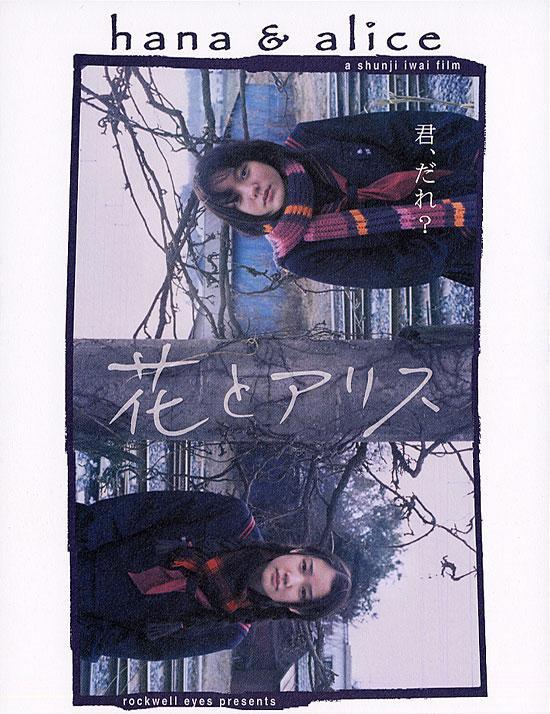Shunji Iwai, the contemporary well-known Japanese film director, made his reputation with the box-office hit Love Letter (1995), and achieved the commercial yet controversial success of Swallowtail Butterfly (1996) and All About Lily Chou-Chou (2001). He is known for his insightful touch and merciful pity on the life of mankind. His themes usually cover heavy subjects such as inevitable death, cruel and shambolic youth, lost and desperate love, and the unbearable struggle. However, in Hana and Alice (2004), Shunji Iwai broke away from his past preoccapations of depression, hidden bitterness and blues and delivered to the audience a colorful, light, and youthful dream. As the director himself remarked, his school days always inspire him. In fact, he thinks he is better at delightful works and does not like his serious and heavy works as much. When he was shooting the film, the world of comedy was lingering over his mind.

Hana and Alice
The story begins with Hana's secret crush on the handsome boy Miyamoto. One day, on their way home, Hana and Alice come across Miyamoto, who accidentally falls down and gets a concussion. Hana immediately catches the opportunity and lies to Miyamoto, saying that she is his girlfriend but he cannot remember her because he lost his memory after the falling down. To cover her lies, Hana gets Alice involved. Soon, an intangible romance gradually and secretly develops between Alice and Miyamoto after a short time of hanging out together. Envy, suspicion, misunderstanding, and fighting begin to ruin the trust and friendship between these two young girls.
Of course, the two girls' intimacy stands the test of time. The film centers around their mutual trust, support and comfort. Hana is a shy and diffident girl, while Alice has an energetic and outgoing disposition. When Hana refuses to go to school, Alice takes Hana to learn ballet, to make many friends and to enjoy life. At one point Alice embarresses herself on stage and everyone leaves-everyone except Alice. After knowing that Miyamoto has a crush on Alice, Hana voluntarily gives in and wishes them happiness forever, but that doesn't last long. Alice and Hana misunderstand and even hurt each other in an effort to become the apple of the boy's eye. But at last, they choose to defend their friendship. They used to dance ballet together, go to school together, throw cherry blossoms on the way to school together, take pictures of some unknown handsome foreign boys together and run in the rain together. All of these precious moments are indispensible to their life. They cannot afford to lose each other. The film ends with the restoration of their friendship, though their puppy love fails.

Alice in ballet
Throughout the film, the sentimental and delicate music, the dreamful photos of friends together, the blooming cherry tree, the vast greenness of land, the fairylike drops of rain, the deep and blue sky with clouds, and the elegant ballet dancing of Alice all add sentiment and romance to the film with their delicate details. In this subtle narrative, Shunji Iwai perfectly weaves a delightful dream for the audience. It is a nostalgic memoir of the pain and innocence of growing up. It is the romantic, vivid and bitter lament of forever lost puppy love. It is, most importantly, a sentimental carol of the secrets between two young, dear girls.
This stands original

